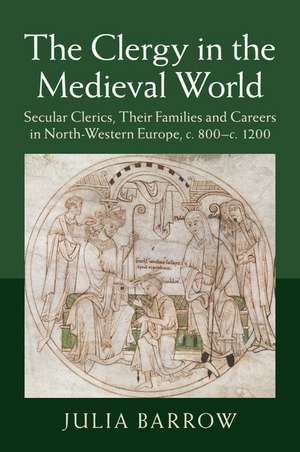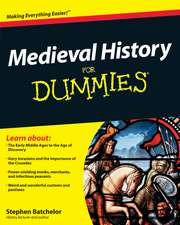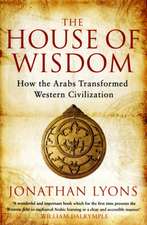The Clergy in the Medieval World: Secular Clerics, their Families and Careers in North-Western Europe, c.800–c.1200
Autor Julia Barrowen Limba Engleză Paperback – 19 oct 2016
| Toate formatele și edițiile | Preț | Express |
|---|---|---|
| Paperback (1) | 277.76 lei 6-8 săpt. | |
| Cambridge University Press – 19 oct 2016 | 277.76 lei 6-8 săpt. | |
| Hardback (1) | 622.48 lei 6-8 săpt. | |
| Cambridge University Press – 14 ian 2015 | 622.48 lei 6-8 săpt. |
Preț: 277.76 lei
Nou
Puncte Express: 417
Preț estimativ în valută:
53.15€ • 54.92$ • 44.21£
53.15€ • 54.92$ • 44.21£
Carte tipărită la comandă
Livrare economică 19 martie-02 aprilie
Preluare comenzi: 021 569.72.76
Specificații
ISBN-13: 9781107451308
ISBN-10: 1107451302
Pagini: 470
Ilustrații: 3 maps
Dimensiuni: 150 x 229 x 24 mm
Greutate: 0.64 kg
Editura: Cambridge University Press
Colecția Cambridge University Press
Locul publicării:New York, United States
ISBN-10: 1107451302
Pagini: 470
Ilustrații: 3 maps
Dimensiuni: 150 x 229 x 24 mm
Greutate: 0.64 kg
Editura: Cambridge University Press
Colecția Cambridge University Press
Locul publicării:New York, United States
Cuprins
1. Introduction; 2. The clerical office, grades of ordination and clerical careers; 3. Rules for life: monastic influence on the secular clergy; 4. Clergy as family men: uncles and nephews, fathers and sons among the clergy; 5. The fostering of child clerics: commendation and nutritio; 6. The education of the cleric, I: schools; 7. The education of the cleric, II: schoolmasters, curricula and the role of education in clerical careers; 8. Household service and patronage; 9. Clergy of cathedral and collegiate churches; 10. Clergy serving local churches, 800–1200: the emergence of parish clergy; Conclusion.
Recenzii
'Julia Barrow's magisterial social history of medieval clergy brings into sharp focus many aspects of the medieval Church hitherto only vaguely understood. A previously fragmented field of study is synthesised as a unified whole, resting on deep and secure scholarship. It is a tremendously important book.' David d'Avray, University College London
'Julia Barrow has produced a master work that is at once engaging, important, learned, and original. Focusing on Continental Europe and the British Isles, Barrow has tackled the medieval clergy as a whole. Many works treat, say, monks and monasteries, or bishops and cathedrals. But no book has the breadth or depth of coverage that Barrow has achieved. Barrow is attentive to fundamental issues of continuity and change and to regional diversity. This book will be essential reading for medievalists and church historians. It is certain to be a reliable standard for a long time.' Thomas F. X. Noble, University of Notre Dame
'This is an impressive book, on a topic that should be well known but is not. It provides an expert overview of the clergy in a period that bridges four dynamic medieval centuries and many regions. It is also a social history that makes 'the Church' come alive, in all its human diversity.' Mayke de Jong, Utrecht University
'Clergy were central to medieval communities, but studies of them tend to be technical, specific, and obscure for non-specialists. Julia Barrow's thorough but admirably lucid overview is approachable at all levels. Historians will be stimulated by her broad-scale comparisons, and anyone interested in medieval society will find their understanding enriched.' John Blair, University of Oxford
'Professor Barrow's ambitious study of the clergy between c.800 and c.1200 provides an excellent framework for understanding the development of an important but surprisingly neglected group. Historians of medieval society and particularly of the medieval church will welcome this book, which provides a deeply researched and comprehensive overview of the subject but will also serve as the starting point for much future work.' Hugh M. Thomas, University of Miami
'Julia Barrow has produced a master work that is at once engaging, important, learned, and original. Focusing on Continental Europe and the British Isles, Barrow has tackled the medieval clergy as a whole. Many works treat, say, monks and monasteries, or bishops and cathedrals. But no book has the breadth or depth of coverage that Barrow has achieved. Barrow is attentive to fundamental issues of continuity and change and to regional diversity. This book will be essential reading for medievalists and church historians. It is certain to be a reliable standard for a long time.' Thomas F. X. Noble, University of Notre Dame
'This is an impressive book, on a topic that should be well known but is not. It provides an expert overview of the clergy in a period that bridges four dynamic medieval centuries and many regions. It is also a social history that makes 'the Church' come alive, in all its human diversity.' Mayke de Jong, Utrecht University
'Clergy were central to medieval communities, but studies of them tend to be technical, specific, and obscure for non-specialists. Julia Barrow's thorough but admirably lucid overview is approachable at all levels. Historians will be stimulated by her broad-scale comparisons, and anyone interested in medieval society will find their understanding enriched.' John Blair, University of Oxford
'Professor Barrow's ambitious study of the clergy between c.800 and c.1200 provides an excellent framework for understanding the development of an important but surprisingly neglected group. Historians of medieval society and particularly of the medieval church will welcome this book, which provides a deeply researched and comprehensive overview of the subject but will also serve as the starting point for much future work.' Hugh M. Thomas, University of Miami
Notă biografică
Descriere
The first broad-ranging social history in English of the medieval secular clergy.













